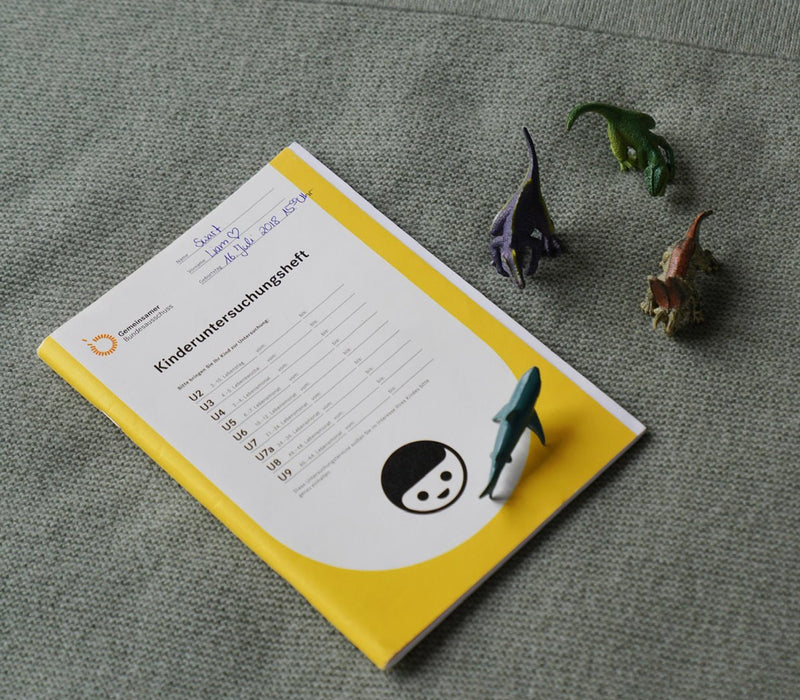Almost 800,000 infants are born in Germany every year. While most babies are born healthy, there are children who are born with serious but treatable medical conditions. These disorders can run in any family, even families where they are not known. Newborn screening helps healthcare workers identify and treat these diseases before they become serious. Sometimes a child's behavioral problems or developmental delays may not become apparent until the first 6 years of life. If such an abnormality is detected early, your child can be optimally supported through targeted measures. In this way, any delays can often be compensated for or at least influenced in a beneficial way.
Doctor Visits
Child check-ups, in short the U-examinations, ensure from birth to the age of 6 of your child that possible health disorders or abnormalities in development can be recognized and treated at an early stage, so that your child can also be given targeted support and encouragement in the event of illness. The early detection examinations therefore offer a certain degree of security. Since child development proceeds at a different pace for each child, it is particularly important to go to the 9 free examinations.
Participation in the early detection examinations is free of charge. It is important that you bring your child's vaccination card, health insurance card and yellow booklet (health card) with you to every examination. The individual examination appointments must be arranged with the medical practice that you have selected for your child. In order for the doctors to be able to assess your child's development without interruption, certain periods of time are provided for each check-up, for which you should make an appointment in the doctor's office.
There is no doubt that you too will have questions before the individual examinations. So that you don't forget them at the doctor's, it's best to write them down beforehand. Your own health and that of your partner is also important. If you're feeling depressed, stressed, or exhausted, tell the doctor what's going on. Your baby's doctor is also there to help you.
The very first assessment of your baby is the Apgar test, also known as the Apgar score. This is a basic evaluation of your baby's condition one minute and five minutes after birth. It assesses the baby's appearance, pulse, reflexes, muscle tone, and breathing. Specifically, the following aspects are examined:
- General Examination of the Newborn: This involves checking for any abnormalities or deformities.
- Measurement of Size, Weight, and Head Circumference: The baby's physical measurements are recorded.
- Assessment of Heart and Lung Function: The healthcare provider listens to the baby's heart and lungs to ensure they are functioning properly.
- Examination of Genital Area, Hips, Umbilicus (navel), Eyes, and Ears: This involves checking for any issues or anomalies in these areas.
- Neurological Examination: Reflexes and other neurological signs are assessed to ensure proper neurological development.
The Apgar score is a quick and effective way for healthcare professionals to evaluate a newborn's overall health and well-being immediately after birth. It helps identify any immediate concerns that may require medical attention.
The second examination, known as U2, typically takes place in the first few days after birth, usually between the 3rd and 10th day of life, at the maternity hospital. The focus of U2 includes:
- Comprehensive General Examination: This involves a thorough inspection of the newborn to identify any skin changes, symmetries, discolorations, swellings, or other abnormalities.
- Growth Assessment: Measurements of the baby's size, weight, and head circumference are taken and compared to standard values.
- Skin Examination: The skin is examined for any abnormalities, discolorations, rashes, or other changes.
- Heart and Lung Examination: The healthcare provider checks the heart and lung function by listening to them (auscultation). They look for unusual sounds, rhythms, or breathing patterns.
- Abdominal Examination: The abdominal area is examined through palpation (gentle pressing). This assesses the position and size of internal organs and looks for any hardness or swelling.
- Ears and Eyes: Special attention is given to hearing and vision function. For infants and young children, assessments like the red reflex in the eyes are checked.
- Mouth and Throat: The mouth is examined for anomalies, inflammations, or other abnormalities in the oral cavity.
- Neurological Examination: This involves checking reflexes, muscle tone and strength, coordination, and other neurological functions.
- Joints and Bones: The examiner checks if all joints are normally mobile and looks for signs of bone or muscle problems.
- Genital Area: An examination is performed to ensure that the external genitalia are developing normally and to detect signs of infections or other issues.
- Hip Ultrasound for Early Detection of Hip Dysplasia: This helps identify hip dysplasia, a condition where the hip joint doesn't develop properly.
- Red Reflex Test of the Eyes: Examination of the eye's fundus (back part) using a special lamp (ophthalmoscope). In normal cases, light reflects as red from the retina. If the red reflex is absent or irregular, it could indicate eye conditions such as cataracts, eye tumors (retinoblastoma), retinal disorders, or eye malformations.
- Blood Sampling (PKU Test): A blood sample is taken to test for rare metabolic disorders.
If you gave birth at home or in a birthing center, you will need to schedule an appointment for U2 at a medical practice soon after birth.
The U3 examination takes place between the 4th and 5th week of the baby's life. The focus of this examination is on:
- Reassessment of Growth and Development: There is a reassessment of the baby's growth, including measurements of size, weight, and head circumference. The baby's development is also evaluated to ensure that it is progressing appropriately for its age.
- Neurological Examination and Reflexes: The doctor conducts a neurological examination to assess the development of the nervous system. This includes an evaluation of reflexes and other neurological indicators.
- Hip Ultrasound: A hip ultrasound is performed to check for signs of hip dysplasia or other hip conditions. This is an important examination to ensure that the baby's hips are developing normally.
- Heart and Lung Check: The baby's heart and lung function are reviewed to ensure that they are functioning normally.
- Nutrition and Development Counseling: Parents receive counseling and information about the baby's nutrition and development. This may include guidance on breastfeeding, introducing solid foods, or general care and development of the child.
The U3 examination is an important opportunity to ensure that the baby is growing and developing healthily. It also allows parents to ask questions and receive support in caring for their baby.
Your baby is getting bigger! It's three to four months old now and it's time for another appointment. At the U4, the focus is on your child's physical and mental development. Possible problems with your child's drinking and sleeping habits should also be discussed.
The U4 examination focuses on the physical and mental development of your child. Additionally, any potential issues related to your child's feeding and sleeping behavior should be discussed. Here's what's typically assessed during the U4 examination:
- Growth and Motor Development Check: The healthcare provider will assess your child's growth by measuring height, weight, and head circumference. They'll also evaluate your child's motor development to ensure they are reaching appropriate developmental milestones.
- Hearing and Vision Screening: Your child's hearing and vision will be examined to identify any potential issues. Early detection of hearing or vision problems is crucial for timely intervention.
- Oral and Dental Examination: The mouth and teeth will be examined to check for any dental issues or abnormalities. This can help ensure your child's oral health is on track.
- Hip Development Check: A check of your child's hip development is done to rule out any hip dysplasia or developmental concerns related to the hips.
In addition to these physical assessments, the U4 examination is also an opportunity for parents to discuss any concerns or questions they may have about their child's behavior, feeding habits, or sleep patterns with the healthcare provider. This examination is a crucial step in monitoring and promoting your child's overall health and development.
Your child is now almost a year old and can celebrate this milestone with another doctor's visit. Similar to previous check-ups, measurements will be taken, the healthcare provider will observe whether your baby's development and behavior are age-appropriate, and a physical examination will be conducted. Here are the key aspects focused on during this examination, known as the U6:
- Growth, Development, and Motor Skills Check: The healthcare provider will assess your child's growth by measuring height, weight, and head circumference. They will also observe your child's overall development and motor skills to ensure they are meeting age-appropriate milestones.
- Vision and Hearing Screening: Your child's vision and hearing will be screened to identify any potential issues. Early detection of vision or hearing problems is crucial for appropriate intervention if needed.
- Oral and Dental Examination: The mouth and teeth will be examined to check for any dental issues or abnormalities, promoting good oral health.
- Hip Development and Gait Assessment: A check of your child's hip development and walking pattern (gait) will be performed to ensure there are no issues with hip dysplasia or walking development.
- Hematocrit and Hemoglobin Testing: Blood tests for hematocrit and hemoglobin levels will be conducted to assess your child's overall health and iron status.
Additionally, during the U6 examination, your baby may receive recommended vaccinations as part of their immunization schedule.
This check-up is an important milestone in your child's healthcare journey, ensuring that they are growing and developing as expected and receiving any necessary medical interventions or vaccinations to support their health and well-being.
The U7 examination is due when your child is around two years old. At this point, your child is likely very active, running around quickly, trying to mimic more words, and wanting to do everything by themselves. During this examination, various aspects are assessed, including:
- Assessment of Language Development and Communication Skills: The doctor will observe your child's language development and assess how well they can communicate. This may involve assessing how many words the child can speak and how they express themselves.
- Checking Vision and Hearing: The examination also includes tests to check your child's vision and hearing to ensure they can see and hear well.
- Examination of Teeth and Mouth: The mouth and teeth are examined to ensure that dental development is proceeding normally and there are no dental issues.
In addition, the U7 examination includes a developmental assessment as well as a psychosocial and behavioral examination. In some cases, an autism test may also be conducted to detect early signs of autism.
The U7 examination is an important opportunity to ensure that your child's development in various areas - language, vision, hearing, oral health, and behavior - is in line with age norms. Early detection of any issues and the provision of appropriate support are crucial to ensure that your child grows up healthy and well-developed.
As children often attend daycare or preschool and enjoy playing with others at this stage, the U7a early recognition examination provides an opportunity to assess their developmental progress. The focus of this examination is on dental care, language development, motor skills, and vision.
At the U8, your child is usually 4 years old and probably already has a large vocabulary. Your child will expect a thorough physical exam from head to toe. The functionality of the organs, hearing and vision, and above all the language development and body control of the child are checked. Be prepared to answer questions about your child's independence and social behavior. All children will have their blood pressure measured and a hearing test performed. The medical staff also draws attention to the dental early diagnosis examinations and provides information about important vaccinations .
This last early detection examination often takes place shortly before entering school. The focus of this examination is on the language development of your child in order to be able to positively influence possible abnormalities through targeted support. Your child's hearing will also be checked. In addition, your child will be physically examined and attention will be paid to possible developmental abnormalities. Any gaps in the vaccination card will be checked in order to give your child all the necessary vaccinations before they start school.
Tip
The Federal Centre for Health Education (Bundeszentrale für gesundheitliche Aufklärung or BZgA)
The BZgA offers numerous informational materials and brochures on various health topics, including the U-examinations.
Continue reading

Initial equipment for premature babies
By Babybox Team
